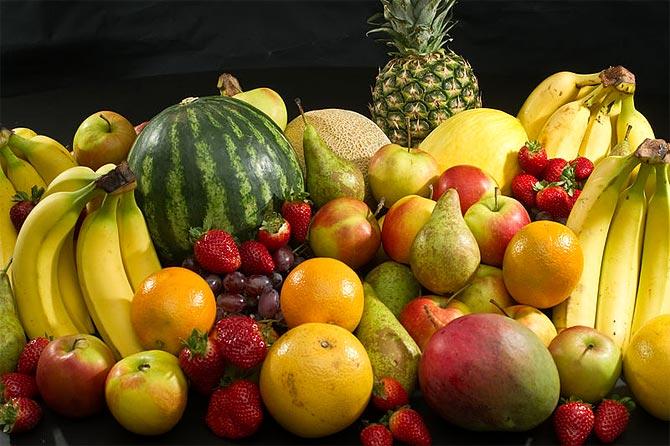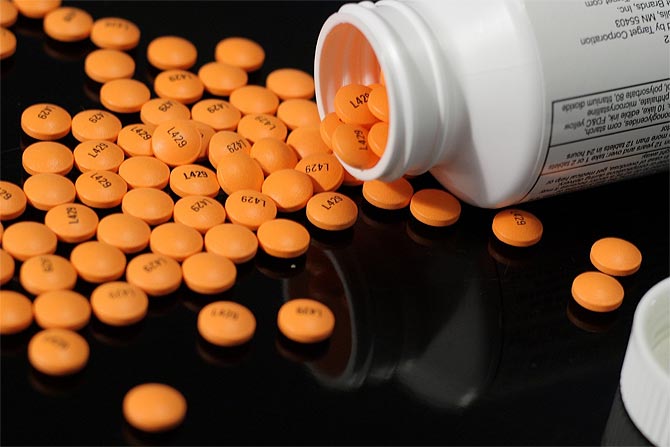Photographs: Atomicbre/Wikimedia Commons
All the health buzz from around the world that matters to you
Researchers have said that eating more fruits and vegetables may reduce the risk of stroke worldwide.
Researchers conducted a meta-analysis of 20 studies published over the last 19 years to assess the effects of fruit and vegetable consumption on risk of stroke globally. The combined studies involved 760,629 men and women who had 16,981 strokes.
Stroke risk decreased by 32 per cent with every 200 grams of fruit consumed each day and 11 per cent with every 200 grams of vegetables consumed each day.
Yan Qu, M D, the study’s senior author, director of the intensive care unit at Qingdao Municipal Hospital and professor at the Medical College of Qingdao University in Qingdao, China, said improving diet and lifestyle is critical for heart and stroke risk reduction in the general population.
Qu said in particular, a diet rich in fruits and vegetables is highly recommended because it meets micronutrient and macronutrient and fiber requirements without adding substantially to overall energy requirements.
Macronutrients (carbohydrates, protein and fat) provide calories or energy. Our bodies need smaller amounts of micronutrients such as vitamins and minerals.
The researcher cited studies demonstrating that high fruit and vegetable consumption can lower blood pressure and improve microvascular function. It has favorable effects on body mass index, waist circumference, cholesterol, inflammation and oxidative stress.
The beneficial effects of fruits and vegetables applied consistently to men and women, stroke outcome and by type of stroke (caused by clot or bleeding). Researchers found no significant difference in the effect on age (younger or older than 55).
The study has been published in the American Heart Association’s journal Stroke.
Please click NEXT to continue reading
Exercise before eating to control diabetes
Photographs: Anna Langova/Wikimedia Commons
Researchers have suggested that brief bursts of intense exercise before meals helps control blood sugar in people with insulin resistance more effectively than one daily 30-minute session of moderate exercise.
The study used a cross-over design, meaning that each participant acts as their own control, and questions can be answered with a much smaller number of participants.
Nine individuals (2 women, 7 men) were recruited. All had blood test results showing insulin resistance, were not on cardiovascular or diabetic medication, were aged 18-55 years (mean age 48), and had a mean BMI 36 kg/m2. They included two newly diagnosed type 2 diabetics only detected as part of the screening.
The participants completed three separate exercise interventions in randomised order. Measures were recorded across 3 days with exercise performed on the middle day, as either of the following three:
1. Traditional continuous exercise (CONT), comprising one 30 min moderate-intensity (60 per cent of maximal heart rate) session of incline walking before dinner (evening meal) only;
2. Exercise snacking (ES), consisting of 6×1 min intense (90 per cent maximal heart rate) incline walking intervals finishing 30 min before breakfast, lunch and dinner, with one minute slow walking recovery time after each minute of intense exercise;
3. Composite exercise snacking (CES), encompassing 6X1 min intervals alternating between walking and resistance-based exercise (with a one-minute slow walking recovery minute after each minute of exercise), again finishing 30 min before breakfast lunch and dinner.
ES and CONT were matched for energy usage, whereas ES and CES were matched for time but CES provided a brief workout for all of the body’s major muscle groups across the day.
Meal timing and composition were the same for all three exercise interventions, and monitored using diet records, daily verbal discussion, and dietary analysis software.
Female participants completed the trials in the early follicular phase of their menstrual cycle (across three separate cycles), whereas male participants had a minimum of 7 days between trials.
The researchers found that the ES and CES routines controlled blood sugar more effectively than the CONT routine, particularly 3-h post-meal glucose following breakfast (17 per cent reduction compared to no exercise) and dinner (13 per cent reduction compared to CONT).
Across the day this represented a 12 per cent reduction in mean post-meal blood glucose concentration. The effect of the pre-lunch ES on blood glucose levels after lunch was unclear.
Moreover, the reductions in blood glucose with ES compared to CONT persisted for a further 24 hours across the day following exercise.
The new research has been published in the journal Diabetologia.
Please click NEXT to continue reading
Frequent arguments linked to early death
Photographs: A scene from the movie Unthinkable
Researchers have suggested that frequent arguments with partners, relatives, or neighbours may boost the risk of death from any cause in middle age.
The evidence suggests that supportive social networks and strong relationships are good for general health and wellbeing, but the authors wanted to find out if the stressors inherent in family relationships and friendships had any impact on the risk of death from any cause.
They therefore quizzed almost 10,000 men and women aged 36 to 52 about their everyday social relationships. All the participants were already taking part in the Danish Longitudinal Study on Work, Unemployment and Health.
The researchers focused particularly on who, among partners, children, other relatives, friends and neighbours, made excess demands, prompted worries, or was a source of conflict, and how often these arose. They also considered whether having a job made any difference.
The health of the study participants was tracked from 2000 to the end of 2011, using data from the Danish Cause of Death Registry.
Between 2000 and 2011, 196 women (4 per cent) and 226 men (6 per cent) died. Almost half the deaths were from cancer, while heart disease/stroke, liver disease, and accidents and suicide made up the rest.
Around one in 10 study participants said that their partner or children were a frequent or constant source of excess demands and worries; around one in 20 (6 per cent) and a further 2 per cent claimed this for relatives and friends, respectively.
Similarly, 6 per cent had frequent arguments with their partner or children, 2 per cent with other relatives, and 1 per cent with friends or neighbours.
After taking account of a range of influential factors, including gender, marital status, long term conditions, depressive symptoms, available emotional support, and social class, as defined by job title, the analysis indicated that frequent worries or demands generated by partners and/or children were linked to a 50 per cent-100 per cent increased risk of death from all causes.
The research has been published online in the Journal of Epidemiology and Community Health.
Please click NEXT to continue reading
Don't use aspirin to prevent heart attacks
Photographs: Ragesoss/Wikimedia Commons
The United States Food and Drug Administration (FDA) has warned the public in a statement that most people shouldn’t take aspirin to prevent heart attacks.
According to Bloomberg, the FDA said in a statement that ingesting aspirin on a regular basis isn’t recommended to people who have never experienced a cardiovascular event because the drug raises a person’s risk of experiencing stomach and brain bleeds.
Even people who are at high risk for cardiovascular disease, but haven’t experienced any symptoms yet, should refrain from taking the drug as a preventative measure, they said.
In short, the benefits of the drug only outweigh the risks in cases where people have already experienced a stroke or a heart attack.
The announcement was prompted by the FDA’s decision last week to block pharmaceutical company Bayer AG from changing the drug’s labelling.
The proposed changes would have allowed the company to market aspirin as a heart attack prevention drug for people who don’t have heart problems.





Comment
article